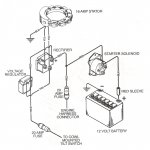GradyWhiteFisher204
Cadet
- Joined
- Jun 4, 2017
- Messages
- 12
I recently got this classic 50 on a bass tracker that is charging around 17v while cruising. I'e heard bad rectifier could be the cause. Also battery could be the cause. The battery is a maxx-29dc that tests good. But also have heard that these motors aren't supposed to use "maintenance free" batteries. Could this be the cause? And is there a way to test the rectifier to see if it' the problem. Any help is appreciated.




















